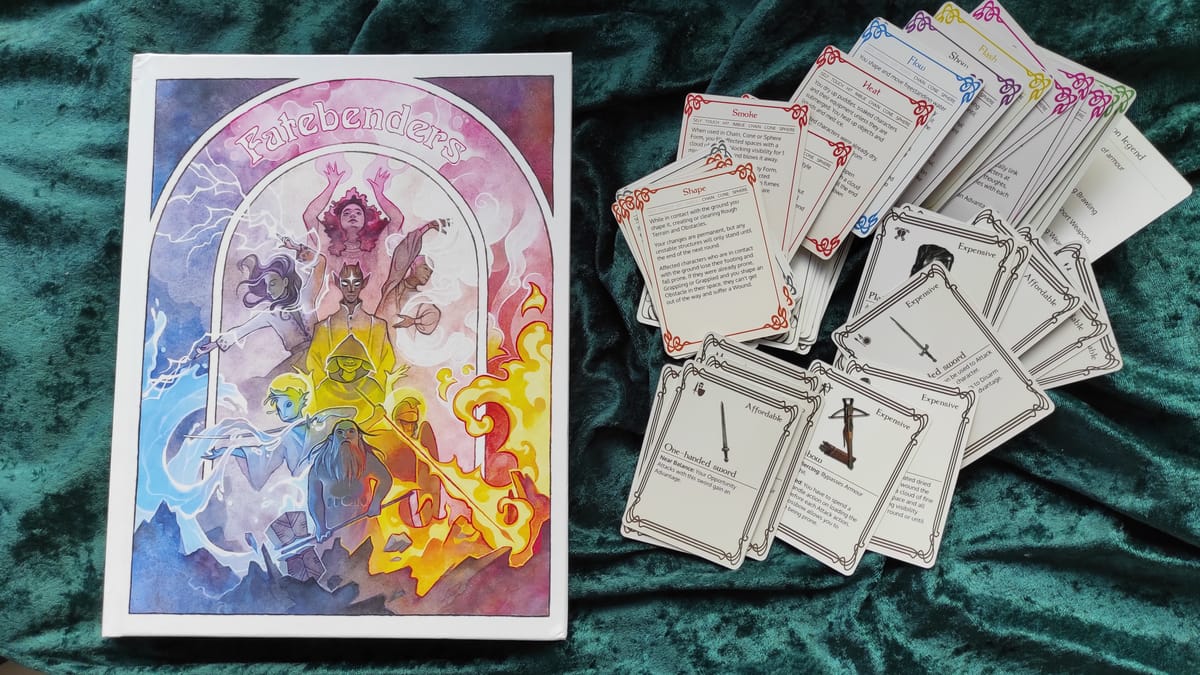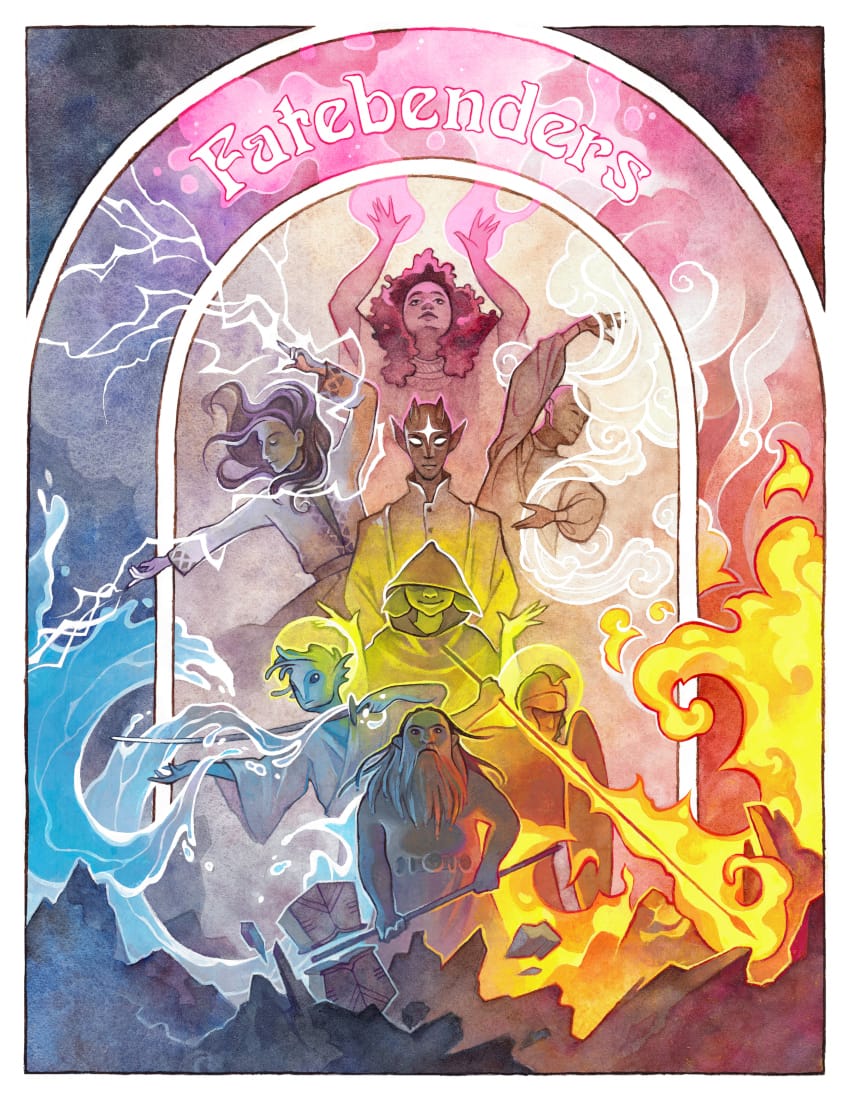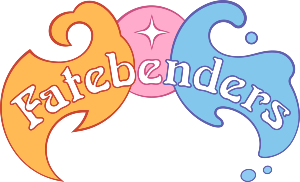Fatebenders - a new approach to tabletop RPGs
What if an RPG was all about the player characters aspiring for their personal goals?

I present you with Fatebenders - an urban fantasy tabletop RPG available from 23rd September on DriveThruRPG.
What is Fatebenders about?
Player driven story
Think of all the exciting ideas that you've had for your characters in other RPGs but never got to realize because there was some prepared plot that needed to be followed, some monster slain or some villain defeated. In Fatebenders, the only encounters a GM prepares are encounters to challenge the goals of player characters. And when they accomplish a goal, all player characters are rewarded with XP, which is the main source of progression in the game.
Player driven scope and theme
By choosing their party's starting city faction players radically change what the game is about - from street urchins to the royal family. From students of a mystic academy to thieves or smugglers. Then, when players create bonds between their characters, they create personal stakes and priceless fuel for roleplay. And then each time a player chooses a new goal for their character, they steer the direction of the story, but also its scope and theme - Is it epic or personal? Is it about investigation, romance, action or drama? Or just having some fun in the world that you describe together.
Sandbox urban fantasy adventure
Whatever goal a player defines for their character, they will likely find at least several ways to pursue it if they go to a city. A city gives the Game Master freedom to pull all kinds of characters out of the hat without breaking immersion on how they got there. And as long as the party remains in a city, the consequences of their actions and decisions will sooner or later present themselves, making player choices matter.
Sandbox urban fantasy sounds awesome, but who would have time to prep whole cities?
Fatebenders alleviates game prep work as much as possible. There are 3 things I think more RPG publishers could do:
Provide generators
To prepare a fantasy city for a sandbox adventure would involve a daunting list of arbitrary creative decisions about the city's aesthetic, geography, districts, factions, characters, their motives, assets, weaknesses, abilities, equipment and names - lots and lots of names. To automate this work I built the Fantasy kingdom and settlement generator on Chartopia. It lets you define what kind of settlement you want, generates it using over 60 different random tables and lets you copy it as formatted text and paste it to your campaign notes.
Delegate descriptions to players
In Fatebenders the GM doesn't need to come up with descriptions or read anything aloud to the players. Instead players draw and answer questions to describe each new NPC they interact with and each new location they have an encounter in, including the layout and interactable objects in rooms and terrain and environmental dangers in outdoor locations. This also keep the payers more engaged and makes locations and NPCs more memorable while keeping the game setting fresh and full of surprises for the Game Master.
Define prep procedures
Fatebenders lists everything you need to do to prepare for a session and to run it. These lists help the GM organize their prep, do it efficiently, know when they are prepared enough, stop worrying about not being prepared enough and know what else they can do to make the prepared encounters more engaging after everything necessary is prepared.
What about magic?

Attunement is the magic system in Fatebenders that gives you free-form control over one of the four classical elements along with lightning, illusions, body and mind. Abilities of different elements can synergize or counter each other. Each ability can be used in different forms and freely controlled within the chosen form. There's no mana or spell slots. Instead using an ability in a larger form has a higher chance to fatigue its user, with overexertion potentially leading to death.
What is combat like in Fatebenders?
Swift and dangerous
No initiative
First the PCs act together in any order, then opponents and then allied NPCs. This way players who know what they want to do don't need to wait and players who need time to think can take their time. Also, acting together makes teamwork and combat formations quite powerful for both the party and their opponents.
No damage rolls
1 Hit = 1 Wound. Sustaining a wound is enough to send an NPC fleeing if they have no personal stake in this fight. Any character starts dying from their third wound and wounds take time to heal even with magical healing, so no combat is risk free for the party.
Tactical and engaging
Countering
Different weapon types have different mechanics and rock-paper-scissors-like relationships, so players view them not as steps in a linear progression toward the most powerful weapon, but as tools - each to be preferred in some appropriate circumstance. Same goes for elemental abilities.
Positioning and visibility
Characters can take advantage of weapon and ability range, flanking, obstacles, cover, darkness, clouds, illusions and camouflage.
No classes
All characters can do all combat actions, like shove, grapple, intimidate, taunt, disarm or attempt anything else.
No single best combat action
Many actions are situationally better than simply attacking as they can create a lasting advantage or force opponents to lose an action or trigger multiple Opportunity Attacks.
Players of dying characters are engaged
A dying player character can still act at the cost of fatigue and can decide to make The Last Stand - They spring back into action with reclkess abandon to help their friends, but will not survive this combat no matter what. Think Boromir Boromir in his final moments.
What content got published?
-
The RPG and the Game Master's guide are tightly packed into one affordable 78 page hardcover book and it's the only book you will ever need to play it.
-
All of the book's content is available for free in PDF format (the PDF has been available for a few months now).
-
The game comes with a set of free online tools to streamline session prep and play:
-
A deck of cards can be ordered as a quality-of-life improvement to draw random items or NPC abilities or give the cards for rules reference to players who use these items or abilities.
Why is it free?
My goal with Fatebenders was to create an RPG that helps as many players as possible experience stories that are about their character, so putting the game behind a paywall would just get in the way. If you like the game and want to support me, you can order the hardcover book or the card deck.
I published Fatebenders into the Public Domain - Anyone can copy, change and republish anything from the book without even crediting me with the work, except for all the art which is copyrighted by the artists. No, no AI art was used.
Ok, thanks, but who are you anyway?
I'm Robert Peetsalu, a hobbyist RPG designer, game master and player from Estonia. Professionally I'm a system analyst with a passion for prototyping, usability testing and creating a streamlined user experience. I hope this passion shines through the layout and flow of chapters, the conciseness and clarity of wording and the interplay of rules in Fatebenders.
Contact me with any questions at robert.peetsalu@gmail.com
I need images for my article. Gimme.
Press kit (Google Drive folder)






